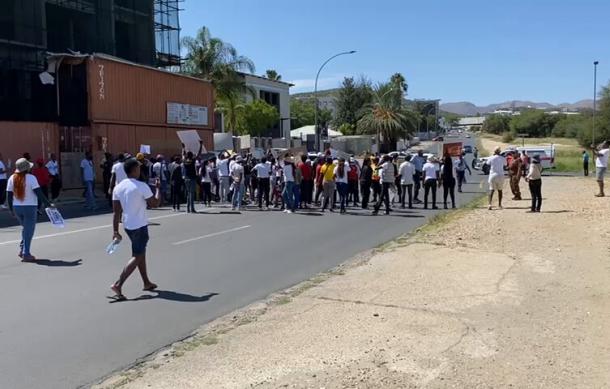
Debate on a bill that could restrict demonstrations at certain public institutions and places that are likely to compromise national security has been postponed to September.
Under the preliminary provisions, the objective of the Public Gathering Bill is to facilitate and protect the exercise of the rights and freedoms guaranteed under the Namibian Constitution and to take measures to maintain public health, public order, and public safety.
The proposed bill prohibits the holding of public demonstrations in restricted areas that have been identified as court buildings, the National Assembly and the National Council, State House, airports, embassies, and other buildings used as foreign mission offices, military buildings, correctional service buildings, and buildings of the central intelligence service.
Organisers of the public gatherings or processions will be required to give notice to the police five days before such a demonstration.
However, the police can accept a notice given at least 48 hours before the date of the demonstration if reasonable reasons are given for the shorter period of notice. In the event of a shorter notice period, which may be declined, the police must provide reasons in writing for the decision.
"Failure to give notice is an offence that attracts a fine not exceeding N$5,000 or imprisonment not exceeding 1 year. The police may hold a consultative meeting after receiving the notice if they hold the view that the meeting is necessary. Weapons are not permitted at public gatherings or processions; this does not apply to a police officer acting in a capacity at a public gathering. This is important to prevent any loss of life due to injury or damage to property arising from any shooting, especially in a situation where there are rival groups. Contraversion of this attracts a fine not exceeding N$10,000 or imprisonment not exceeding 2 years," explained Dr. Albert Kawana, the Minister of Home Affairs, Immigration, Safety, and Security.
Following the tabling of the bill in the National Assembly by Minister Albert Kawana, a debate ensued, and the first to rise was PDM MP Maxmillian Katjimune, who rejected the bill.
"When there is growing public destain about particular economic and social issues in the country, issues relating to the economy and unemployment, and then there's an upsurge in demonstrations because of those issues, the government must deal with the substantive issues as they are and not try to be creative by introducing oppressive laws such as this."
In response, Dr. Kawana pointed out that Namibia's record in upholding and protecting human rights is among the top in Africa and the world, pointing out that Namibia will maintain that. He added that the government would not want to go back to the apartheid past.
Another PDM MP, Elma Dienda, then rose, stating that she needs time to study the document and asking that debate on the bill be postponed to when the National Assembly resumes in September.
The Speaker of the National Assembly then pointed out that MPs will have enough time to study the bill as debate on the proposed legislation will not be rushed.
"We are not doing anything out of order; the bill is to be subjected to normal scrutiny, and it is up to the recommendation by the honourable minister what measures to fast track, but my recommendation is that we should not rush; we can even refer it to a workshop, and when we come here, we will deal with it in a manner that is in line with the bill of this nature."
Debate on the bill was postponed to September.





